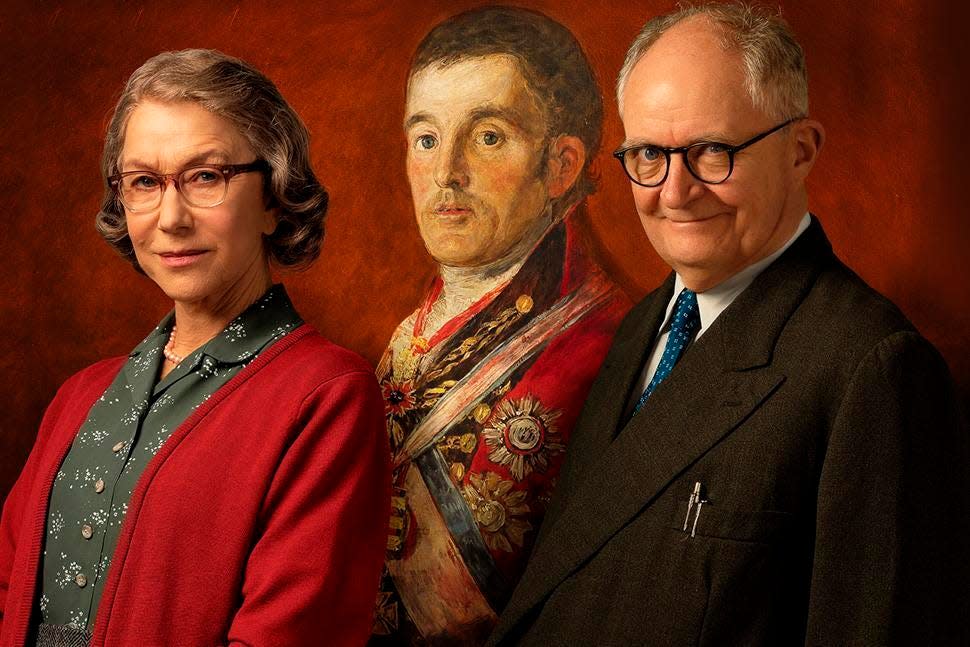British crime caper 'The Duke' follows real-life Robin Hood type

- Oops!Something went wrong.Please try again later.
- Oops!Something went wrong.Please try again later.
Kempton Bunton, the real-life protagonist of British crime caper “The Duke,” starting at Ragtag Cinema on Friday, is a man in constant conflict.
While eking out a living in very blue-collar Newcastle, he writes plays and scripts that speak to the ills of the working class in Britain while conveying a sadness that can only come from an unfulfilled life full of family tragedy.
As played by character actor Jim Broadbent, the audience gets a sense of the passion struggling underneath his hangdog demeanor.
He takes up the social cause of protesting the government’s requirement for a television license, arguing that pensioners and war widows should be able to seek solace from the sadness of their lives with escapism without the bureaucracy. It’s no wonder the state-sponsored BBC rejects everything he sends them.
But Kempton does not confine his activism to his writing. He protests on street corners, writes angry letters to elected officials, and generally drives his family to distraction on the subject.
It’s an odd fixation, but a noble one that’s as earnest as it is persistent. If Kempton lived in modern times, his misplaced yet sincere crankiness would make him an ideal Twitter user.
More: How 'Top Gun: Maverick' upholds Tom Cruise as our last true action hero
His wife — played with perfect pitch by Helen Mirren — cannot understand him and barely tolerates him. Kempton cannot keep a job, as he has a bad habit of sticking up for the little guy getting bullied by upper management. When fired, he lies to his family about going to work. He is a man who means well but invites some of the hardship he receives.
The only thing that really keeps “The Duke” from entering all-out Ken Loach territory (not a bad thing!) is the intrigue which arises from the reveal that Kempton is a master thief. Sort of.
Somehow, the old guy sneaks into the National Gallery in London and swipes Goya’s portrait of the Duke of Wellington. He finds all the hoopla and fuss over the unveiling of the portrait offensive in light of the suffering his fellow Englishmen face. Perhaps ripping off some fancy artsy types might take the upper class down a peg or two.
Seemingly implausible, our hero uses this theft to anonymously demand — you guessed it — relief from that television license for low-income residents. Law enforcement is flustered; they expected to pay a king’s ransom and not a Robin Hood-type crusade.
It’s not a big shock that Kempton is collared for the heist as the film opens with a glimpse of him on trial. The story is more complicated than it appears. But “The Duke,” in its third act, goes from a very interesting character study to a very interesting legal procedural.
Kempton’s lawyer, played by Matthew Goode, puts on a dazzling case that places the question of intent at its center. By the end, the film becomes a really smart courtroom drama.
A little bit of research reveals the case and subsequent trial played out in real life as depicted in the movie. It captured the popular imagination, even getting a quick reference in the James Bond classic “Dr. No.”
More: Married actors live out fairy tale in Arrow Rock Lyceum Theatre's 'Shrek: The Musical'
Whether the film explores classism of 1960s Great Britain or the contours of the modern criminal code, “The Duke” never loses sight of creating well-composed portraits of its characters. They are complicated, principled.
With the cast headed up by Broadbent and Mirren, I feared this would be one of those arthouse "Mom Movies" that has broad laughs and simple resolutions, playing to an older crowd. You know what I am talking about. The types of movies your mom takes her friends to see while splitting a bottle of white wine.
But “The Duke” avoids these trappings with quirky social conscience and a deeply-realized narrative. Although your mom and her friends will like it too.
One thing I didn’t know going into “The Duke”: it’s the final film of director Roger Michell. Better known for directing Julia Roberts and Hugh Grant in the charmer “Notting Hill,” he also aptly adapted Jane Austen’s “Persuasion” in 1995. A filmmaker with a light but classic touch, he died last fall at the age of 65 before the film was released. That places a sad pall over “The Duke,” which already has a bit of melancholy to its proceedings.
“The Duke” has a lot of surprises and makes for a nice artsy excursion into a summer movie season that already shows a lot of promise. It’s a delightful experience — try to catch it before the film leaves town.
In real life, James Owen is a lawyer and executive director of energy policy group Renew Missouri. He created/wrote for Filmsnobs.com from 2001-2007 before an extended stint as an on-air film critic for KY3, the NBC affiliate in Springfield. He was named a Top 20 Artist under the Age of 30 by The Kansas City Star when he was much younger than he is now.
This article originally appeared on Columbia Daily Tribune: British crime caper 'The Duke' follows real-life Robin Hood type

